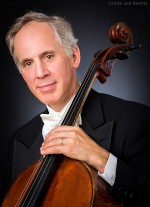Column Name
Title
One of the things you should know about Eric Bartlett (BM ’78, MM ’79, cello) is that he and two of his four siblings rode their bikes across the country in 2005—11 weeks, 4,400 miles, and 200,000 feet of climbing, from California to Maine. He had taken a leave of absence from the New York Philharmonic, where he’s been a cellist since 1997. A longtime member of the Orpheus Chamber Orchestra, Eric has also been a member of ensembles including the Mostly Mozart and American Ballet Theater orchestras, Speculum Musicae, the New York New Music Ensemble, and Columbia String Quartet. He has taught at the Manhattan School of Music and has been on the Juilliard faculty since 2004, where, among other things, he coaches the Juilliard Chamber Orchestra, which performs on November 17. He was also one of the faculty members involved with the inaugural Orchestral Orientation class for freshmen this fall.
Body
How does the new freshman orchestra class compare with what you had when you arrived at Juilliard?
There is no comparison! When I got to Juilliard in 1975, I was thrown into the deep end of the pool, just the same as all my classmates. There was no actual instruction on how to play in an orchestra, how to prepare or how to audition, and one learned mostly from observing more experienced colleagues. The new freshman program will not only be valuable for the information imparted to the new students, but also for the tone that it sets about the importance of orchestra among the skills they are learning as students.
What three pieces of advice do you wish you’d had before you began your orchestral career?
Listen, listen, listen! Listen to the colleagues around you, and find a way to blend your sound into theirs. Listen to what the conductor is saying, and try to understand his or her concept of the work from those comments, so that you can apply it throughout the work. Listen to your colleagues in other sections not only to be inspired by them but also to better understand the whole work, not just your little corner of it.
What are the easiest and hardest aspects of coaching the Chamber Orchestra?
Every year there are a few students who are reluctant to get drawn into the shared responsibility of Juilliard Chamber Orchestra (J.C.O.), and through it the shared excitement. The hardest part is always trying to find a way to get through to those few. The easiest part is the concert; if I do my job well I am completely superfluous by the time the concert comes around, and I can just sit back and enjoy it.
What should we be looking and listening for at the November 17 performance?
Look for an incredibly committed, dynamic performance, and see if I was able to convince everyone of the incredible rewards for playing in that committed way.
What’s the secret to playing without a conductor?
Many people think that the challenge of playing without a conductor is staying together, but it turns out those are the easier challenges to solve. The harder part is finding the collective will to make musically compelling performances. The two most important ideas to focus on are finding and agreeing on the character of the music, and then identifying the thread of the music, the musical element that you want the listener to hear and follow.
You and your wife (violist Sarah Clarke) were in Orpheus together for a long time. What’s the secret to performing with your spouse?
Two key principles we emphasize both in Orpheus and in J.C.O. are mutual respect and civil discourse. If everyone in an ensemble remembers those two things at all times, things go much more smoothly. I think it was actually good for our relationship that we were in this group together. We had the same conviction about building the group’s reputation, and we had the same schedule. In the early ’90s we also took our son on a handful of big international tours.
When did you first know you wanted to be a musician?
My first teacher was a violinist teaching class lessons. He gave us a real sense of the joy of playing together, but it was my second teacher, George Finckel, who made a career playing the cello feel like a mission or a calling.
Who was the teacher or mentor who most inspired you when you were growing up?
Leopold “Terry” Teraspulsky was the first teacher to show me how to take apart a piece of music into its separate phrases, how to put it back together again, and how to convey character.
If your students could only remember one thing from your teaching, what would you want it to be?
First identify the character of the music, and then let all of your other musical choices support that character.
What are you reading?
I just read A History of the Middle East by Peter Mansfield. The conflicts there are far more complicated than we wish they were—and were a few thousand years in the making.
Is there anything you’d like to add?
I feel strongly about supporting living composers. On November 1, Albany Records released The Essence of Cello: Works Written for Eric Bartlett with four works that I commissioned and performed. I have also commissioned three new works for cello quartet, one of which, by Pre-College composition major Aiyana Braun, was premiered by my erstwhile ensemble CelloFest! recently.
If you weren’t in the career you are in, what would you be doing?
Probably something involving computers and writing code, possibly combined with leading bike tours around New England.





